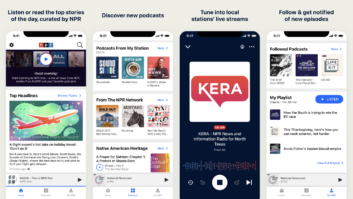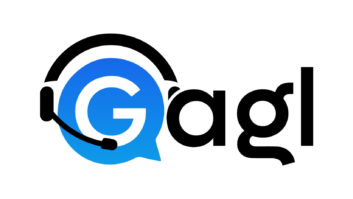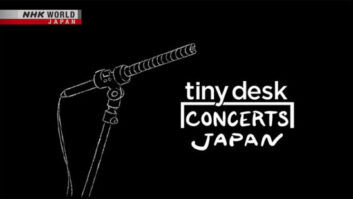
Ari Shapiro uses the Comrex/LTE kit to talk live on ‘All Things Considered’ as part of NPR’s New Hampshire Republican primary coverage. Photo by Arnie Seipel/NPR
NPR is using a Comrex/LTE package in its election coverage. (LTE is a standard for wireless high-speed data over mobile phones and data terminals.) I talked to NPR News Director of Operations Charlie Mayer via email to learn more about it. He’s worked on NPR election coverage in various roles since 2000. He produced the coverage in 2002 and 2004; his main job now is to support “big gigs” like coverage of Iowa, New Hampshire, conventions and election night.
Charlie, how did this come about?
The NPR technology team keeps on top of innovations in remote broadcasting technology. We first used the Comrex Access with our IP satellite phones for overseas deployments. We plugged a UML 290 Pantech modem into a Comrex Access on March 4, 2011. Several successful live broadcasts followed. Two highlights: Sen. Kent Conrad was the first person to talk live on NPR via Comrex/LTE. This happened on April 7, 2011. On April 21, 2011, Ari Shapiro did a great shot via Comrex/LTE while hustling around with the White House travel pool.
Describe the equipment and system setup in detail, including what’s in a typical kit. How many kits are there?
The typical kit is:
·Comrex Access2 with AC power supply and one battery
·Pantech UML 290 LTE modem
·Shure BETA 57A mic
·Sony MDR-7506 headphones
·Mic tripod, gooseneck and shockmount
·Cables
We include a headphone splitter and second set of headphones for any kit that might be used by a newsmaker — i.e. Sen. Conrad. This allows the field producer to listen along with the newsmaker.
We also include alternative means of connectivity, which includes:
·USB wi-fi adapter and extender cable
·USB POTS modem and cable
·Ethernet cable
·Small Ethernet router and extra Ethernet cable
We have 22 kits in total: 10 are deployed overseas, often with BGAN satellite phones. 12 are used domestically.
How did the system perform in Iowa? What audio quality and technical observations can you share, good or bad, for other potential users?
The Comrex/LTE kits performed well in Iowa. The audio quality was good and operation was easy for our reporters and producers. We did experience some interference at one location. We resolved this by asking the reporter to go outside, which resolved the problem — though it was chilly for the reporter. We are going to bring some USB extender cables to New Hampshire. We think that we may avoid this interference by operating the LTE modem via a 1-foot extender cable.
What does this arrangement allow NPR or its people to do, that you couldn’t do prior?
The Comrex/LTE combination gives us solid and reliable connectivity that is truly mobile. On Caucus Night, this meant that our top talent was not necessarily tethered to our fixed ISDN lines at the Romney and Santorum locations. We made good use of those ISDN lines, but at 8 p.m. Eastern when the caucuses opened, Ari Shapiro and Don Gonyea were able join us live from two different caucus sites on Comrex/LTE.
-You wrote earlier that the “Comrex/LTE combination will change how NPR covers Election 2012.” In what way?
Campaign coverage is all about mobility. The campaigns are constantly moving. We’ve gotten good at filing from campaign buses using 3G EvDO. We did that for the first time from John Kerry’s bus in 2004. This is great for filing voice tracks, but it does not work for live filing. With Comrex/LTE, we plan to do lots of live filing from the road — wherever the candidates happen to be. For example: Ari Shapiro did live interviews via Comrex/LTE on each of the two days after the Iowa Caucuses as Mitt Romney campaigned in New Hampshire on Wednesday and South Carolina on Tuesday. We can expect to hear much more of this as the campaign continues.
-For a reader interested in LTE in general, what should they know going in? Any traps to avoid or tips to help?
The technology is great, but it takes a lot of time to fully understand it. NPR is fortunate to have a strong team that has taken the past two years to study LTE, Comrex and other exciting new IP technologies. We have also invested heavily in Tieline’s Report-IT platform, which turns just about any iPhone into a recording and transmission tool. (Case study here. Article here.) The successful deployment of this technology requires coordination and teamwork between engineering, IT, operations and journalists. NPR has worked hard to build these connections as we deploy IP audio technology. Our recent success with Comrex/LTE is thanks to a great team working together.











